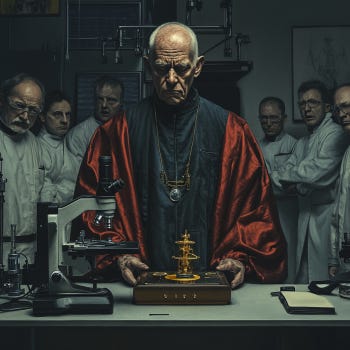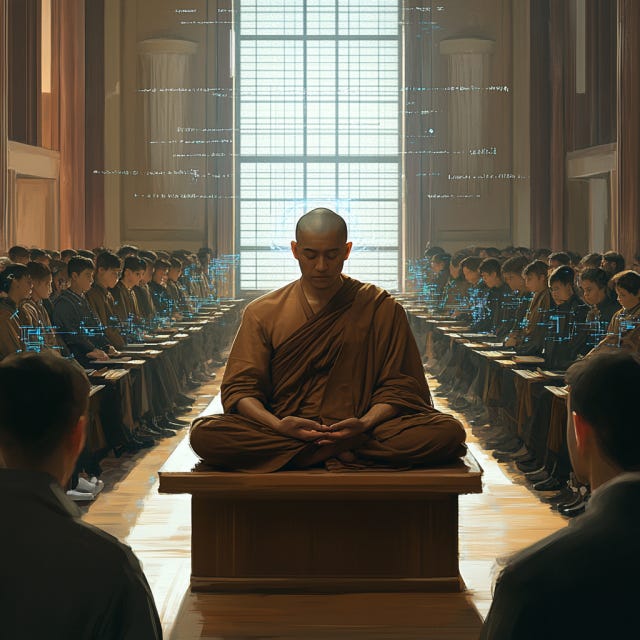A Future Beyond Materialism: Holistic Civilization
How the next civilization will synthesize intuitive spiritual truth and material reductionism... developing a new class positioned to unfuck socio-materialist mistakes.
While this is a long article, it contains a lot of background and is well worth the read.
While many are acting to Restore the West and I respect that as an initiative, we should try looking ahead to how the next civilization is going to function. Whether that next civilization is a restored western ethos, or something entirely new we don’t know yet. Often civilizations fall apart due to an over-indulgence in what once made them strong. Looking at the Faustian West it is our tendency to reach for eternity while ignoring far more pressing, real, and less idealistic questions of human nature.
The Failures of Post-Modern Science
Modernity is based on a reductionist and highly materialistic view of reality. The scientific method is an effective approach to problem solving in an iterative way. It’s incredibly effective, particularly when it’s applied by large populations performing problem-solving at a very small individual scale; make small changes, observe the result, repeat, publish a paper. Academia has become excellent and churning out small-scale iterative advancements produced by subject-focused researchers.
Unfortunately these methods do not support major breakthroughs as well as our society would like to imagine. Instead they create an environment where quality is defined by the number of publications one writes rather than by the impact of those publications. An ever-reducing return-on-investment due to economic and procedural pressures. The ultimate midwit victory.
The modern sciences consist of breaking down problems to their smallest components and seek to understand each component individually. Once understood, the whole is reconstructed solely as an intellectual combination of components. This works well for the physical sciences. It does not work well for aspects of reality that contain significant emergent properties.
The breakout of AI was not caused by individuals understanding how specific portions of code alter outcomes, it was performed by creating a gigantic mess of code and stirring it around until the answers it pumped out started looking good. An emergent system. According to conventional thinking, results should have suffered significantly from over-fitting in the output data. Instead, we arrived in the early 21st century.
Importantly, this leads into some very important questions about the basic assumptions of our materialist and reductionist society. We’ll come back to how AI systems fit in to this in a bit.
It appears that the reductionist consensus is beginning to break down. Particularly, it now appears that pure reductionist science is not nearly as effective in complex emergent systems like biology, sociology or anthropology. Thus, we are now the very beginnings of a sociological revolution emphasizing new ideas. We’re witnessing the birth of a post-materialist era. Highly complex systems are going to be recognized as necessitating a far more holistic approach. The resultant world view will be reflected in culture and society as a counter-balance to the most extreme materialist culture in human history i.e. modern Western civilization.
Thesis and Antithesis
Hegel described a process of Thesis and Antithesis in his dialectic. One does not need to observe this as a discussion between individuals. Rather may be observed as a paradigm. Prior to the enlightenment, the thesis for understanding reality was one of holistic mysticism applied to achieve specific aims through rote. While esoteric, that trial-and-error method of advancing our understanding of reality resulted in successful means of performing tasks. Frequently via methods we would now find highly suspect. Interestingly, many of those ancient techniques actually worked, the people at the time simply didn’t understand why or how.
With the enlightenment, an Antithesis was provided in the form of materialist reductivism and the scientific method. To understand aspects of the natural world it was possible to break it down minimal components and then adjust those components to observe response. The scientific method was a highly effective technique for understanding systems as a whole. Things like the ideal gas law, physics, micro processing, and electricity were all created by coming to understand the fundamental firmament on which reality resets: laws about the basic interactions of things.
For thousands of years, the original thesis of gods and mysticism stood unchallenged. Dreams and omens were treated with very real deference and gods were provided with offerings to change the weather. In contrast, the last 400 years or so emphasize the scientific method as the only acceptable method of seeking solutions. It has been so over-emphasized that people are scarcely able to claim reasonable conclusions without a half dozen scientific citations to back them up. Even when the state of reality is painfully obvious we’re reliant on scientific citations. Example from summer 2024 below:
The over-reliance of modern thinking on scientific ideals goes beyond a simple quest for supporting documentation. Rather, thought-leaders are treated with divine deference and science-worship has become the go-to for many modern talking heads. Attempts to apply the scientific method in situations where it’s not really applicable combined with the dogmatic approach to “trust the science” of the pandemic period has created an environment where people have become rightfully distrustful of so-called experts.
That brings us to where we stand now, at the failure of post-modern and scientific western traditions. Western society is thus beginning to explore larger questions around morality, sociology, and society that do not lend themselves to simple scientific publications. These questions seek answers in the form of more completed philosophy, not two or three dozen well cited articles. While powerful, the scientific method cannot tell you who to love, or how to love them. It cannot tell you how to build a city, only the buildings inside its borders. People are seeking support for a more intuitive understanding of reality and have realized that the scientific method, for all its power in the prosaic world does not well apply. Intuitive insights are needed, and a society that supports those intuitive insights is slowly emerging.
Machine Learning and LLMs are the first shot across the bow that our consensus of reality is on the verge of radical change. What was once passed off as pseudo-science and superstition, subjects like physiognomy, are making a come back as AI is capable of identifying emergent patterns that cannot be precisely described by “the science”. As one can imagine, the high-and-mighty scientific thought leaders are disdainful and dismissive, and react poorly and self-righteously to the fact that the divinity of their profession is subject to question.
Synthesis
Ignoring the self-righteous indignation of small-minded progressive midwits, one can recognize that a cultural shift is occurring. The 21st century will contain the synthesis of the materialist and objectivist scientific method with the esoteric mysticism that predated it. These two, seemingly intractable, world views are in the process of fusing to produce something new. The next civilization (be it a resurgence of ours or an entirely new one) is going to utilize a new approach to reality as it begins its own upwards trajectory.
The 20th century is the century during which the wars of humanist religion took place. Ultimately humanism and post-modern objectivism have their limits in that they’re decidedly intent on ignoring all larger moral and philosophical ideals beyond the material. The conclusion of that mode of thought will show that all three major humanist religions: liberalism, communism and fascism, are all ultimately failures. The communist seeks a perfect workers paradise, the fascist a tribal mono-state, and the liberal a wishy-washy hedonistic culture unmoored from objective morality.
The new world that we’re blindly stumbling into is going to appear different by the end of this century; A culture where reductionist scientific thinking is applied to small iterative problems, but where larger complex systems are treated with esotericism, even pseudo-superstition. This type of post-modern mysticism I’ll describe as a holistic world view, where complex systems (be they biological or sociological or spiritual) are not deconstructed for understanding by part, but observed to be intuited as a whole.
Of course I promote this type of holistic thinking, as do many modern alternative medical theorists and modern social thinkers. Let’s examine how that culture is likely to structure itself and behave.
The Abandonment of Narrow Systemization
Holicism is likely to become a strong cultural driving component. As strong as the scientific method was for the industrialist era of the 18th to 21st centuries. What form observance takes will depend on the availability of high technology and energy. Books like Breaking Together and The Ecotechnic Future are useful to understand the potential options here regarding how civilization develops as it concludes the global-industrialist era.
New Forms of Truth
The most radical observed difference between societies will be a new approach to spiritual idealism. Historically we’ve observed a “God of the Gaps” form of Christianity, a flawed type of reasoning that we’re slowly breaking away from. The holistic society will embrace spiritualism in ways that we’ve not seen in human society for nearly 400 years. In the West we’re likely to see new forms of spiritual development that are compatible with classically Christian ideals, but ruggedly new. New moral ideals will be a social foundation to repair decay resulting from humanist religions during the 20th century. Humanism produced mass atrocities, materialism, hedonism and nihilism. We will undo the abandonment of the spiritual for the material.
Medicine is one of the first signs of these changing times. While the FDA and similar agencies are mercilessly testing radical new drugs and treatments, the general population has adopted a significant focus on alternative, more holistic, medicines. Alternatives take the form of supplements, vitamins, and more historically unscientific treatments like meditation and acupuncture. What’s more, is that many of these alternative medicines have actually been shown to work and produce significant physiological effects.
The outright rejection of alternatives by the medical establishment demonstrates both the intransigence of pharmaceutical companies, and the materialistic appeal-to-publication expressed by academia. The appeal-to-publication being a specifically dangerous mode of thinking as anything that isn’t funded for publication is ignored, regardless of truth.
As holistic analyses become a more common cultural practice (see the emerging younger generation among the dissident-right) the narrow-minded establishment characters, particularly among the progressive left, will ramp up rhetoric to extreme heights. The climate-scare is an example of establishment academic progressives becoming fearful of losing their position as soothsayers of the zeitgeist. As they become more extreme in rhetoric, so will the general public be less accommodating to them. The event of the Covid Pandemic accelerated this process, but it was already occurring.
People are no longer willing to trust their lives solely to materialistic academic deconstruction. One-size-fits-all prescriptions fall flat in medical applications. Further failures include: Community development. Urban planning. Spiritual and Psychological Fulfillment. The Midwit Problem. Addiction and Counseling. International Economics. Gender (apparently). Anthropology and Sociology. There are many disciplines where a simple reductionist approach cannot properly account emergent systems. Rather, an intuitive approach must be taken, which means rejection of the scientific method as the sole baseline for Truth.
These are all areas where we’re beginning to observe alternative thinkers behaving in unconventional ways. That is beginning of the eventual synthesis of both material sciences and esoteric problem solving: A holistic world view.
The Rise of Mystics
Regardless of the form it takes, the next stage of human development is going to see the rise of a new pseudo-academic and pseudo-spiritual class that we’ll call mystics. There are many names for these types of individuals and they were historically associated with religion. Here is a place where we will see significant divergence from historical precedence in the development of a holistic culture.
Religion will become more focused on the development and defense of the community and community morality (particularly in the United States where it will take on a specifically Christian identity). The New Mystics will not exist as figureheads of religion, nor will they exist as members of academia. A new social institution is going to be forged over the next generation or two.
Academics break problems down into constituent parts to understand those parts in extreme detail. Academics frequently become so hyper-focused on their specific discipline that they are unable to approach boarder problems. This isn’t a flaw, this type of hyper-focus allows academics to clearly and completely understand highly specific sub-components of reality. It does not, however, lend itself to the type of historical Renaissance Man who was well rounded across many different disciplines.
Religious leaders act on the community to encourage, develop, and support the needs of the group. They’re excellent at counseling and shepherding communities through difficult times and acting as the glue that holds society together. They’re good at things like broad spiritual philosophy and morality, but do not excel at mass social psychology.
The holistic mystics will take a generalist academic role in society: that of being broadly studied and able to develop new solutions through intuition rather than hyper-specialized analysis. Mystics will often focus on social and environmental topics but not quite treat them as sciences, more as esoteric artistic forms.
Mystics are going to be broadly studied individuals that intuit solutions to large problems in emergent systems. Many will not be able to accurately describe their reasoning to arrive at those solutions, but the solutions will (generally) be correct. The next generation of thought leaders are going to be post-modern mystics.
The new Mystic class will be an entirely separate branch of the social system: Labor, Politicians/Nobles, Merchants, Academics, Spiritual leaders… and the new Mystic class.
You can see this effect in old farmers or mechanics so well studied that they can immediately tell an engineer “no, that won’t work” based on a general experience rather than specifically pointing out error. That class of individuals will become a codified segment of society allowing a holistic approach to real problems without falling into the granular thinking of the academic or the idealism of religious leaders.
The new mystic class may be born from religious leadership or academic philosophy or psychology or sociology departments. They may grow from think-tanks and consulting firms that approach broader trend-analytics problems…
The class will contain those few academics who reject the manifold untruths of progressivism and embrace a spiritual world-view. They will have an academic focus, but shirk the type of granular navel-gazing typical in academic circles.
We’re beginning to the first-generation mystics make appearances in the world today. Those that are more famous include individuals such as Jordan Peterson with his PhD in psychology, Douglas Wilson the priest and author, and Rudyard of Whatifalthist on youtube. Jordan Peterson is an excellent example of this phenomena as he intentionally mixes theological and psychological verbiage in statements. He accurately describes progressives not as simple idealists, but as people possessed by an evil ideology. They act not in service to themselves, but in service to the ideology. This describes a holistic approach where spiritual grounding is mixed into classically scientific systems… creating a new mode of being with which one can approach reality in an intuitive fashion.
A holistic approach is going to require the emergence of specialists unbounded by modernist materialism and classical religion but capable of interfacing well with both. The holistic civilization will find some way to formalize these individuals, and then apply their thoughts to society as a whole. They will not be religious leaders so much as they will take on the roll of modern social experts while religious leadership shifts to primarily focus on moral community maintenance.
The next civilization will take on a holistic approach to problems, and indulge in what we would today consider superstition. Simultaneously by listening to well studied mystics, the future holistic civilization will be far better equipped to deal with real problems than the post-modern Faustian one.
Many modern well-read and under-employed individuals appear to be angling for this mystic position. Individuals here on substack like myself and the truly brilliant individuals who predate us like Ted Kaczynski understood the world in whole far better than modern academic specialists.
The Holistic Mystics of a High Technic Society
If high technology continues to develop and the industrial base is not significantly damaged by resource shortages or ecological collapse, AI modeling will continue to grow as a basic function of human society. This will fundamentally effect the way in which people observe reality: favoring large data-driven black-box systems over the results driven reductionist scientific model.
AI will be used to produce holistic models of large scale systems. Mystics will become intimately familiar with some of these models and use them. Observations of large social systems will be used to understand function through artificial systems and natural intuition. Societies will be treated as growing organic things rather than machines in need of an engineers tampering.
The results of high technology systems may be used to oversee individual behavior (which is definitely a bad ending) or adjust the behavior of groups by applying subtle pressures over time (a better use for mass data analytics). Large data systems will pump out results that the mystic class will utilize in making new intuitive leaps.
Whether this takes the form of technical integration through large data systems, or it takes the form of cybernetic integration remains to be seen. It really depends on how successful high-bandwidth data systems and AI ultimately are… along with projects like Neural Link. While the mystic class and AI won’t replace the academic class, it will probably supplant the academic class as thought-leaders by the mid 22nd century. The general population will practice a form of psuedo-superstition, adhering to the mystics and their AI systems with the same zeal with which they listen to the science today.
Alternative Future: One of Limited High Technology
If the industrial base becomes unsustainable or ecological collapse becomes unmanageable, then the high technology of black-box AI systems will not predominate implementation of the holistic worldview. Instead additional focus will be placed on the mystic class as individuals. Additional resources will likely be spent in broad-subject-training for the mystics themselves and a class of support personnel will act to provide additional context.
In the case without advanced AI and trade systems, the mystics will end up exerting additional social power once they’ve established themselves in parallel with classical academics. Generalized research institutions supported by a broad tax base and pumping out their own mystics for the purposes of overseeing society. This will eventually lead to the same types of certification-inflation that we’re living through here at the beginning of the 21st century. It may result in a schism between the Church, the Academics, and Mystic. It’s likely that whichever 2 of those organizations end up teaming up will become the social governors of the culture (probably the church and the mystics).
In the context of a regressive technic civilization where high technology isn’t available, the social conventions will tend toward superstition and esotericism regardless. The mystics are likely to become a subcategory of general academic, or spiritual guru, or both. Rather than occupying a separate position in society applying large data models, they’ll be associated to specific broadly-studied disciplines and act in concert with other societal institutions. Retaining a leadership position and supplanting academia, but being less-separate from it than in the case of a high technic society.
Spiritual and Social Developments of the Holistic Civilization
Holistic civilization will approach reality with a certain grounded hands-on perspective that both Apollonian and Faustian culture have historically traded for idealism. Ultimately it will be for the betterment of human civilization, but it will mean giving up a certain youthful vigor. Holicism will reject the idea that reality, biology, and sociology can be molded by a sufficiently skilled artisan or redesigned by an adept engineer. It will see mankind as a shepherd to the planet and ecosystem.
Pharmacology, agriculture, urban planning, and sociology will all take on spiritual facets that rely on the burgeoning mystic class. A more stable society will form for the purposes of social cohesion. The new society will be less innovative than Faustian civilization has been, and will be too tempered to reach for the stars with one hand while attempting to yank the rest of humanity into the industrial revolution with the other.
Just as a child likes beautiful things without understanding them, the Apollonian culture sought perfection of form. Just as the teenager believes himself invincible and capable of inhuman feats, Faustian culture reached for the stars. Holistic culture will view the world with a wiser realism more detached from fantasy. Social morays will exist for the purposes of cultural maintenance, not idealism. Many modern people will view this as a radical cultural step backwards. Temperance is often seen that way.
The new form of spirituality will be compatible with Christianity, but will take on a decidedly different flavor than observed via scientific reductivism. Spiritualism will be broadly seen by the mystic class as a category of study. God will be worshiped as fundamental Truth rather than personified. The mystics and AI models and the natural world will all be considered aspects of Godly governance similar to how ancient priests saw the natural world as an aspect of God’s creation… leading to the scientific method through efforts to understand that creation.
Holistic society will respond to the demographic collapse of the 21st century in unpredictable ways. New social taboos are likely to appear that’ll be enforced by both the Church and by the new Mystic class of thought-leaders. These may be as minor as legally limiting the speed of wireless data transfer, or as significant and specific as women being disallowed from utilizing digital communications at all. The degree of social taboo depends heavily on how negative the effects of demographic collapse are and which factions wind up sizing power during the resultant economic chaos.
After the demographic collapse, society is going to view the natural world as something one is governed by. “We’ve already conquered the natural world and look where that’s gotten us” will be a truism with historic precedent. The re-naturalization of the global ecology is going to happen anyway due to demography, but the effects of Holicism will emphasize doing so in an ecologically sustainable fashion. Not fake “sustainability” nonsense, but real long-term species diversification, localization of resources, and decentralization of industry. We’re likely to see both real and engineered species make their way into the wild. New food-chains will be set up in places where they’ve been completely destroyed. A great deal of genetic tinkering is likely to be performed in the naturalization process. Mistakes will be made, but fewer and further between than occurred in our era.
Urban design is also going to be subject so some radical revitalization. Modern cities are an absolute mess from an urban design perspective. Due to the demographic collapse of the late 21st century, large swaths of them are going to become vacant or overrun by vagrants. It will pose a unique challenge and opportunity with a goal of creating actual livable infrastructure. Urban design is likely to refocus again on aesthetics and long-term use. In the modern era, economic reductionism describes a house as a vehicle for investment and a place humans can temporarily occupy. “A machine for living.” In a holistic society, the purpose of a house is for raising the next generation. Urban design will refocus away from brutalist monoculture toward aesthetics and the ability to sustain multigenerational families. Holistic architecture will throw out many of the notions now considered standard.
Pitfalls of Future Generations
While holistic civilization sounds nice, it sounds like the environmental/ecological dream many modern progressives have (and hopelessly fail at implementing because of their violently idealistic world view) , it is not without it’s own pitfalls. Briefly, holistic civilization, the next civilization, will be far from perfect. It is not an ever-lasting civilization utopia. It too will end. The following are a few educated guesses on its inherent flaws:
Over Emphasis on Neo-Tradition
After the rise of the new Mystic class occurs over the next few hundred years we’re going to see an over-emphasis on that new tradition. This’ll be a partial backlash to the humanist anti-traditionalist position, and it’ll be partially due to the way that the Mystic class becomes ingrained as a social class. They will realize their own institutions and those institutions will become aged and decrepit just like all institutions over time.
An anti-geriatric cultural sentiment will have an effect of staving off the cultural decline by an extra century of two. The geriatrics of the 20th and 21st century running the West into the ground will result in cultural taboos. A general “ok, boomer” sentiment will be seen in the population once individuals hit a critical age. The resultant ageism will keep the culture vital, but that too will eventually become a traditional moray that may outlive its usefulness. Oddly, it’ll directly conflict with the mystics themselves once they’re an ingrained class. Decades of schooling lead to aging leadership.
The emphasis on tradition in the holistic civilization is going to eventually render the civilization overly rigid. Something we have a hard time imagining now, but which will become a significant backdrop for cultural peaks and troughs as our post-modern hyper-flexibility has been.
Stagnation in the face of Competition
The stagnation of the culture due to over-emphasized traditionalism will eventually render it into decline in the face of competition. Some new upstart culture or civilization is going to begin producing new things. What form that new culture takes is hardly possible to imagine at this time. Long-term stagnation resulting in a culture falling behind in terms of development is easy to imagine.
Ultimately the culture will fail due to an inability to change trajectories when something new arrives or a significant resource shortages cracks one of the societies pillars. Rigidity makes for a strong foundation, but it also makes that foundation brittle.
Over-inflation of the Mystic Class
Just as happened during the industrial to post-modern age with academics, there will be an eventual formalization and over-inflation of the new Mystic class. The Mystic class is going to be unwilling cede power once they have it, which eventually results in cultural turmoil. The type of science-worship that’s observed today will re-appear as a worship of the mystic class. Large swaths of the population will believe that the new mystic class cannot make mistakes… leading to ego, and eventual mistakes.
The mystic class will be kept in check for a time by the church and academia. Similar to how academia waged war on the Church from 1950 to 2010 or so, the mystic class will eventually seek to use political and social power to suppress.
The creation of this third pillar, the mystic class, may provide more stability. It is still likely to eventually adhere to many of the same, very human mistakes that we’re witnessing now.
Conclusion
Imperfection is the nature of ourselves and our world. A description of what the next civilization will look like is something that holds value as it gives us something to look for. We’re already seeing an emergent class of mystics in a highly informal fashion. Eventually it’ll be formalized, not as media personalities or academic researchers but a new form of human specialist. Civilization will shift from a focus on the deconstruction of reality to an intuitive understanding of emergent forces.









Very interesting!
We are seeing the rise of the "mystic" class right now. More and more companies are hiring engineers--without college degrees. Because they are *finally* realizing that academia doesn't produce engineers. It produces people who can pass tests, sometimes perform high level math, but often have very little ability to apply any of of what they have learned, due to a general lack of interest.
Those engineers did "school" in school--because they were "in school." Not because they ever wanted to build things, or make them better.
To me it was always obvious. People who like doing something tend to be better at it. Many people enter fields--to make money, but don't have a general interest in the field they're going into. From there it's downhill.
This realization is becoming evident now that there is a real world shortage of people who care enough to truly understand complex systems. Their replacements aren’t capable. Now is a great time to *not* retire. 😂🤣
Fascinating thesis. Mystics consulting AI is definitely a plausible future, and it fills with me with dread. A lot to chew on here, and it's great you are willing to posit speculation into the future. It's helpful for me as someone oriented toward philosophy, seeking answers to age-old questions. There are crises ahead (which we are sleepwalking towards) that I must factor into my thinking.